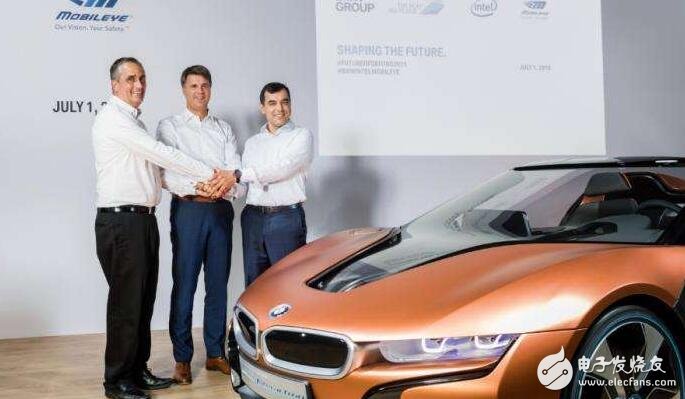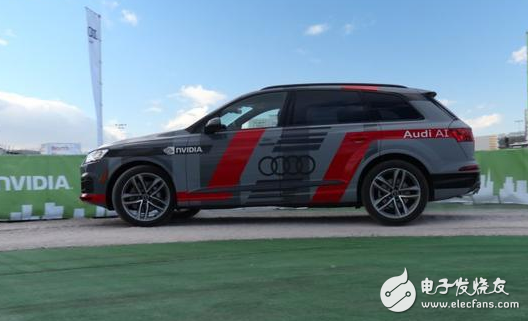Which OEMs, such as Intel/Qualcomm, cooperate with car manufacturers to develop autonomous driving?
Automated driving has already become a new battleground for major chip manufacturers. However, there are not enough chip manufacturers. It is also crucial to promote the development of autonomous driving technology. Today, let's take a look at the OEMs, Qualcomm, Samsung, and NVIDIA.
Intel, BMW, and Mobileye cooperate with self-driving carsOn January 4, 2017, BMW Group, Intel and Mobileye announced that approximately 40 BMW self-driving cars will begin road testing in the second half of 2017. This is an important step for the three companies to fully realize the goal of fully automatic driving. At a joint press conference during the CES, the three companies further revealed that these BMW 7 Series test vehicles will use Intel and Mobileye's cutting-edge technology to begin a global road test journey from the US and Europe.

The BMW Group teamed up with Intel and Mobileye to get the fully-automated car on the road in 2021. From left to right: Intel CEO Ke Zaiqi, BMW Group Chairman Kruger, Mobileye co-founder, chairman and chief technology officer Amnon Shashua
The announcement is the first time that the BMW Group, Intel and Mobileye announced the progress of the fully automated driving program after they announced their cooperation in July last year. Since then, the three companies have been working on developing a scalable architecture. Other car developers and manufacturers can achieve first-class design and differentiated brands on this platform. These products offer a differentiated consumer experience from a single key integration module to a complete end-to-end solution. â€
Mr. Fu Lexi, a director of the BMW Group responsible for research and development, said: “Making full-automatic driving a reality is the common goal of BMW, Intel and Mobileye.
Intel Corporation CEO Ke Zaiqi said: "From the perspective of the industry, by sharing development costs and integrating resources to develop a fully automated driving platform, we have realized cost savings and development speed. This car-to-cloud system will Coherent and predictable behavior and will operate with the highest safety standards. That's why this collaboration is an icebreaker. Our dedicated team has clear common goals and an innovative, agile and responsible culture. â€
Professor Amnon Shashua, Co-founder, Chairman and Chief Technology Officer of Mobileye, said: "We have made significant progress in designing first-class fully automated driving solutions for highways and ordinary urban roads in the past six months. This is an expandable The solution to meet the unique needs of the car manufacturers involved in the project."
Audi teamed up with NVIDIA self-driving cars to be launched in 2020According to the Autoblog website, Audi and NVIDIA have been working together for some time, and most of their results are concentrated on infotainment systems, such as the current version of the MMI multimedia interactive system and Audi's virtual cockpit. Currently, the two companies are cooperating to develop autonomous vehicles equipped with NVIDIA technology. Audi first showed its decision and promised to launch a fully-automobile car in 2020.

These new self-driving cars will be based on NVIDIA's DRIVE computing platform. It uses the latest technology of artificial intelligence concepts, including neural networks, to simulate the way the human brain works by using computer science modeling decisions. This network can learn and improve by creating new connections. The machine learning tasks controlled by the neural network include computer vision, which uses sensors and cameras to help the computer (in this case, the car) figure out what is going on around it.
The two companies have already demonstrated a version of DRIVE on the Audi Q7 with autonomous driving: DRIVE PX 2. At the same time, the utility vehicle can calculate its own path and can sense and drive on different types of surfaces (including road surface, grass and soil), and it can also drive in the simulated building area while reading the dynamic bypass sign. .
Samsung supplies Audi with Exynos processorIn cooperation with Audi, not only NVIDIA, but recently, South Korean media reported that Samsung will supply Audi's Exynos processor to create driverless cars from 2018. In fact, there have been news reports in early 2016. Samsung has set up a working group to develop driverless car chips and sensors.
Although Samsung's pace in the field of driverless cars is a bit slower than other chip giants, with the recent unmanned news, we will find that Samsung has begun to make new progress on car chips.
When it comes to Samsung Electronics, the Korean company, our first reaction is to do mobile phones. Samsung Galaxy Note 7 mobile phone battery explosion caused serious damage to Samsung Electronics, but the smartphone is not Samsung's only product. The company has its own position in a variety of electronic products, such as home appliances, flagship processors and everyday mobile phones.
From the establishment of a chip group specializing in the development of driverless cars, to the acquisition of high-end audio manufacturer Harman International, and cooperation with Audi, Samsung continues to send good news in the field of automotive chips, it seems to tell us that Samsung Electronics will display The technology on the screen, processor, and sensor is applied to the car and continues to glow.
Volkswagen and Qualcomm launch the first car version of the Snapdragon chipsetAs the giant of mobile phone processors, Qualcomm will naturally not be absent in the era of smart cars. At last year's CES show, Qualcomm released its mobile chip Snapdragon 602A vehicle platform, which has a variety of sensing technologies to read the driver's orientation through visual identification, analyze the driver's concentration, and read Take and learn to identify traffic signs and lane separation lines, so that cars can detect road conditions and surrounding conditions in real time. 2017 Audi's new A5 model debut.
However, it seems that Qualcomm's attitude towards the automotive sector has always been small and small. In order to show their determination to enter the auto-driving car chip, in October 2016, Qualcomm dropped a blockbuster into the industry.
Qualcomm announced a $47 billion acquisition of Dutch semiconductor company NXP. In the post-acquisition statement, Qualcomm mentioned that the acquisition will help Qualcomm to improve its position in automotive semiconductor chips such as Advanced Driver Assistance Systems (ADAS), security, in-car entertainment systems, vehicle networking, and powertrain. At this point, Qualcomm quickly strengthened its technical strength in the field of autonomous vehicles and in-car entertainment platforms by acquiring industry giants.
At today's CES, Volkswagen and Qualcomm announced that they will cooperate and witness the birth of a car smart phone chipset. The chip will be used as an in-vehicle electronic device for the Volkswagen cockpit. Qualcomm will provide the Snapdragon 820A processor to the public to promote the application of navigation, audio and intelligent networking systems.
The Snapdragon 820A is a car-class Snapdragon 820 chip, which is currently widely used in smartphones such as the Samsung Galaxy S7, HTC 10 and LG G5. Volkswagen decided to deploy the chip for some of its models. This is the first time that the Qualcomm Snapdragon 820A chip has been used in production models.
Qualcomm and Panasonic Collaborate to Develop Next Generation Android Car Entertainment SystemPanasonic AutomoTIve and Qualcomm of the Panasonic Group have announced that they will jointly develop the next generation of Android-based In-vehicle Infotainment (IVI) systems. The current technology, in addition to controlling the functions of the car, realizes the integration of Google services, Android applications and the car entertainment system. The next generation of IVI system concepts will focus on the passenger application and focus on solving the challenge of passengers (not drivers) entering navigation mode or controlling music.
Google Android Engineering Director Patrick Brady said that Android has developed into a key vehicle platform, which also allows car manufacturers and suppliers to build a powerful next-generation IVI system. At the CES show, Panasonic AutomoTIve and Qualcomm jointly demonstrated the latest IVI system based on Android car functions, which not only controls the functions of the car, but also integrates Google services, Android applications and car entertainment systems.
Panasonic AutomoTIve's partnership with Qualcomm gives drivers a unified experience to adapt to different applications, screen sizes and more. This tuned unified design concept will help OEMs save costs, optimize system engineering investments, and even further customize the entertainment system across automotive production lines.
With the cooperation of both parties, automakers and component suppliers can use Qualcomm's Automotive Development Platform (ADP) and Snapdragon vehicle system single chip. In terms of system design, they can follow the production system developed and manufactured by Panasonic AutomoTIve. The concept system uses Qualcomm's Snapdragon 820Am processor and is based on the latest version of the Android 7.0 operating system. It provides a platform with excellent performance and high performance, and rapidly develops a car entertainment system with cloud links to accelerate the experience of car entertainment. , the speed of innovation with the Internet of Vehicles.
A force-sensing resistor is a material whose resistance changes when a force, pressure or mechanical stress is applied. They are also known as force-sensitive resistor and are sometimes referred to by the initialism FSR
Fsr Sensor,Force Sensing Weight Sensor,Fsr 400 Sensor,Pen Fsr Flex Sensor
Dongguan Nanhuang Industry Co., Ltd , https://www.soushine-nanhuang.com
